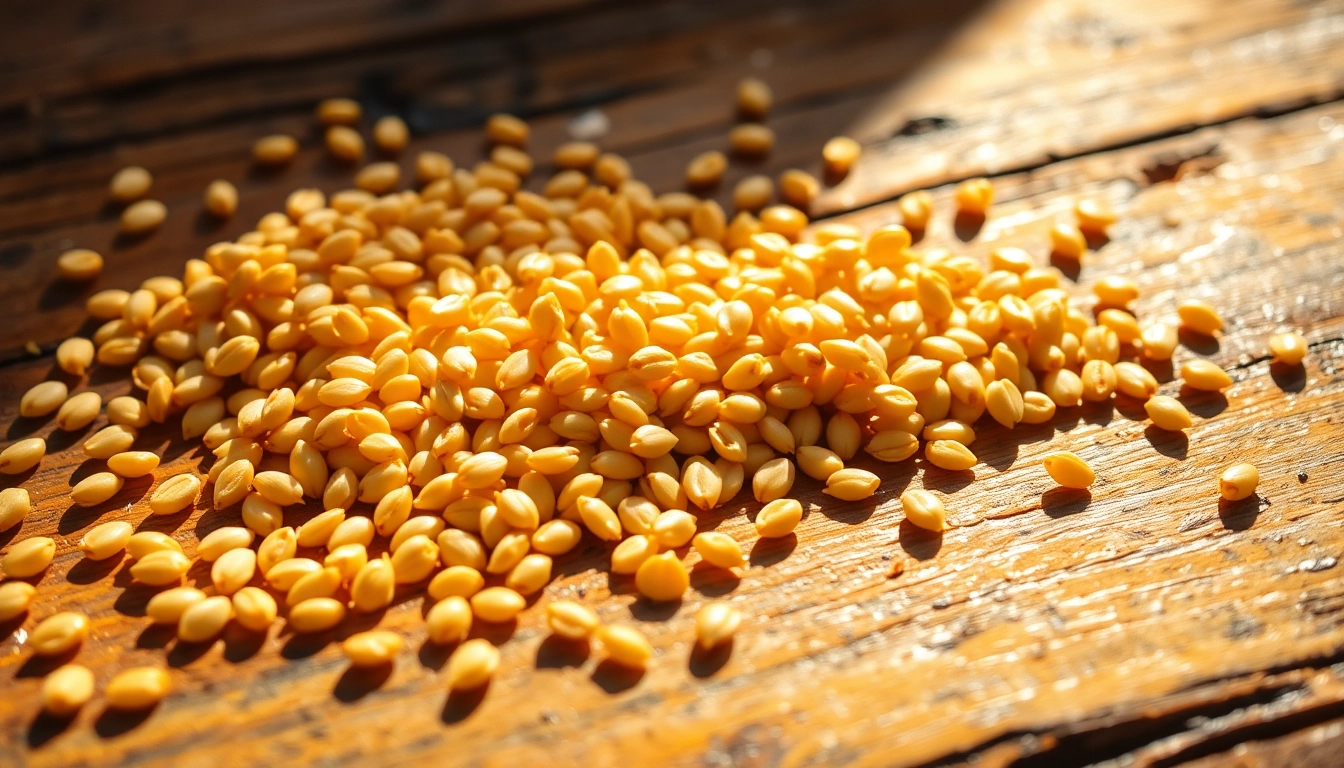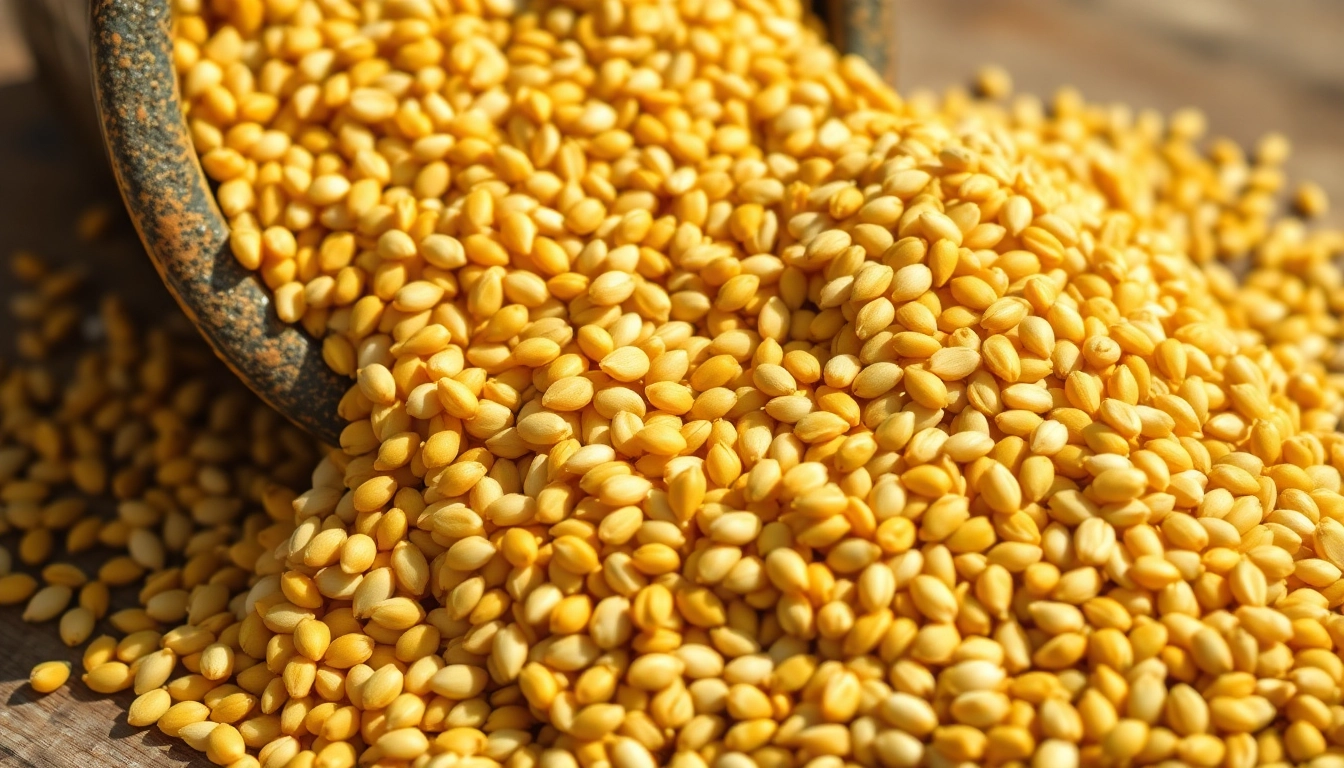Understanding Fenugreek Seeds: Origins and Benefits
Fenugreek seeds have been cherished for centuries, originating from the regions of the Middle East, North Africa, and South Asia. These small, golden-brown seeds have a rich historical significance, often used in traditional medicine and culinary practices. As a prominent spice, fenugreek is celebrated not only for its distinctive flavor but also for its numerous health benefits. In recent years, the global demand for high-quality fenugreek seeds has surged, driven by increasing consumer awareness about natural health remedies and organic food trends. For manufacturers, exporters, and culinary enthusiasts seeking premium fenugreek, Fenugreek Seeds from trusted sources ensure superior quality and authenticity.
Historical Significance and Traditional Uses
Historically, fenugreek seeds have been an integral component of Ayurvedic and Traditional Chinese Medicine, revered for their medicinal properties. They were used to boost lactation in nursing mothers, improve digestion, and regulate blood sugar levels. In culinary history, fenugreek has been a staple in spice blends like Indian curry powders, Middle Eastern dishes, and North African tagines. Ancient texts describe its use in preserving food and enhancing flavor, illustrating its longstanding cultural role. Today, these traditional applications continue, complemented by scientific validation of its health-promoting properties.
Nutritional Profile and Health Advantages
Fenugreek seeds boast a rich nutritional profile, including dietary fiber, proteins, vitamins such as B vitamins, and minerals like iron, magnesium, and manganese. The soluble fiber in fenugreek aids in controlling blood sugar levels and improving digestion, making it particularly beneficial for diabetics. Its antioxidant compounds combat oxidative stress, reducing the risk of chronic diseases. Studies indicate that fenugreek may help lower cholesterol, support weight management, and enhance lactation in new mothers. For health-conscious consumers, incorporating high-quality fenugreek seeds into their diets aligns with a holistic approach to wellness and preventive healthcare.
Common Culinary Applications and Flavor Profile
Fenugreek seeds have a unique, slightly bitter, nutty flavor with hints of sweetness. This distinctive taste complements a variety of dishes, from curries and spice mixes to chutneys and pickles. Ground fenugreek is frequently used in spice powders, baked goods, and marinade blends. Whole seeds are often toasted to enhance their flavor profile before adding to dishes. Their versatility makes them indispensable in achieving authentic flavors in traditional cuisines. Moreover, fenugreek’s aroma adds depth to vegetarian and meat-based recipes alike.
Choosing and Buying Fenugreek Seeds: Quality Indicators and Certifications
For exporters and food manufacturers aiming to provide premium products, selecting the right fenugreek seeds is crucial. Quality indicators extend beyond appearance to certifications and authenticity markers that ensure the seeds meet international standards. Reliable sourcing from certified suppliers guarantees purity, potency, and safety, essential for building trust with consumers worldwide.
How to Select Premium Fenugreek Seeds for Export
Choosing high-quality fenugreek begins with assessing its visual and sensory characteristics. Premium seeds should be uniform in size, with a smooth, intact surface and vibrant golden-brown color. They should have a fresh, earthy aroma free from mold, mustiness, or off-odor. Samples should be free from dirt, stones, or extraneous matter. The seeds’ moisture content is also critical; lower moisture prolongs shelf life and reduces spoilage risks. Certification from recognized authorities, such as ISO, HACCP, or organic labels, further affirms quality.
Certifications and Standards to Look For in Trusted Manufacturers
Reliable manufacturers like Spice Nest offer fenugreek seeds backed by comprehensive certifications that adhere to global standards. Look for certifications such as Organic Certification, ISO 22000, Halal, and Kosher, depending on your target market. These ensure strict quality control, safety, and compliance with international trade regulations. Exporters should also verify whether the supplier conducts laboratory testing for pesticide residues, microbial contamination, and heavy metals, reinforcing product integrity and consumer safety.
Key Factors Influencing Freshness and Aroma
Freshness in fenugreek seeds is maintained through proper harvesting, drying, and storage practices. Seeds harvested at peak maturity have superior aroma and flavor. The drying process should be uniform and controlled to prevent mold growth and preserve essential oils. Storage in airtight, moisture-proof containers, away from direct sunlight, ensures aroma retention and prolongs shelf life. Manufacturers and suppliers must prioritize these factors to deliver fenugreek seeds that retain their preferred sensory qualities and nutritional benefits.
Utilizing Fenugreek Seeds in Food Processing and Manufacturing
In the food manufacturing sector, fenugreek seeds are a versatile ingredient. They are incorporated into spice blends, powders, herbal formulations, and processed foods, enhancing flavor and functional properties. For food producers, maintaining quality and consistency is paramount for consumer trust and regulatory compliance.
Incorporation into Spice Blends and Powders
Fenugreek is a key ingredient in many spice blends like garam masala, curry powders, and Ras el Hanout. The seeds are often roasted and ground, releasing their aromatic oils and imparting characteristic flavor. Using high-quality seeds ensures a potent, authentic taste. Milling techniques should preserve the essential oils and aroma, with modern mills incorporating temperature control to prevent degradation.
Usage in Producing Herbal and Medicinal Products
Beyond culinary applications, fenugreek seeds are integral to herbal supplements and medicinal formulations. Extracts and powders are used in capsules, teas, and topical ointments. Manufacturers should use certified, contaminant-free seeds, ensuring safety and efficacy. Proper extraction methods preserve bioactive compounds such as saponins, flavonoids, and alkaloids, maximizing health benefits.
Best Practices for Storage and Preservation to Maintain Quality
To preserve fenugreek seeds’ aroma, flavor, and nutritional integrity, manufacturers must adhere to best storage practices. This includes using moisture-proof, opaque packaging to shield from humidity, heat, and light. The storage environment should be cool, dry, and well-ventilated. Additionally, implementing inventory management protocols ensures stock freshness, reducing wastage and maintaining consumer satisfaction. Regular quality audits and laboratory testing are recommended to monitor seed stability over time.
Market Trends and Export Opportunities for Fenugreek Seeds
The global market for fenugreek seeds is expanding, propelled by increasing demand from health-conscious consumers, natural remedies, and ethnic cuisines. Major importers include the Middle East, Europe, North America, and Southeast Asia. Understanding prevailing trends and regulatory environments is vital for exporters to capitalize on opportunities.
Global Demand and Consumer Preferences
Consumers worldwide are gravitating toward organic, non-GMO, and sustainably sourced fenugreek seeds. The trend towards plant-based diets and holistic health practices bolsters demand. Countries with vibrant culinary traditions, such as India, Morocco, and Turkey, remain key markets, while Western nations increasingly incorporate fenugreek in health foods, dietary supplements, and natural remedies.
Export Regulations and Quality Standards for International Trade
Exporters must comply with importing country regulations, which often mandate certification, phytosanitary certificates, and testing for contaminants. The European Union, for example, has strict standards on pesticide residues and microbial safety. Adhering to these standards through certified organic and quality assurance programs enhances market access and brand reputation.
Strategies for Manufacturers to Expand Their Reach
To penetrate international markets, manufacturers should develop versatile product ranges, including whole seeds, ground powders, and organic variants. Participation in international trade fairs, such as Biofach or Gulfood, increases visibility. Establishing partnerships with reliable logistics providers and obtaining necessary certifications further facilitate smooth export processes. Educating consumers and stakeholders through transparent marketing reinforces brand credibility and encourages loyalty.
Enhancing Your Brand with Authentic Fenugreek Seeds
Building a trusted brand in the spice industry hinges on authenticity, quality, and transparency. Providing certified fenugreek seeds backed by rigorous quality control and clear labeling not only meets regulatory demands but also appeals to a growing segment of health-conscious buyers.
Building Trust Through Certified Quality and Transparency
Transparency begins with providing detailed product information, including origin, certification marks, and testing reports. Certifications like Organic, Non-GMO, and ISO assure buyers of quality and safety. Offering traceability data reassures consumers and partners about the integrity of the supply chain.
Packaging and Labeling Best Practices
Effective packaging must protect fenugreek seeds from environmental factors while being attractive and informative. Clear labeling with product specifications, certifications, net weight, and usage instructions enhances consumer confidence. Eco-friendly packaging options are increasingly favored, aligning with sustainability trends.
Marketing Tips for Appealing to Health-Conscious Consumers
Highlighting health benefits—such as boosting immunity, aiding digestion, and supporting diabetic health—in marketing campaigns can position fenugreek seeds as a superfood. Leveraging digital platforms, storytelling about sourcing origin, and showcasing certifications serve to strengthen brand positioning. Educating consumers about traditional uses and scientific backing fosters loyalty and encourages repeat purchases.

